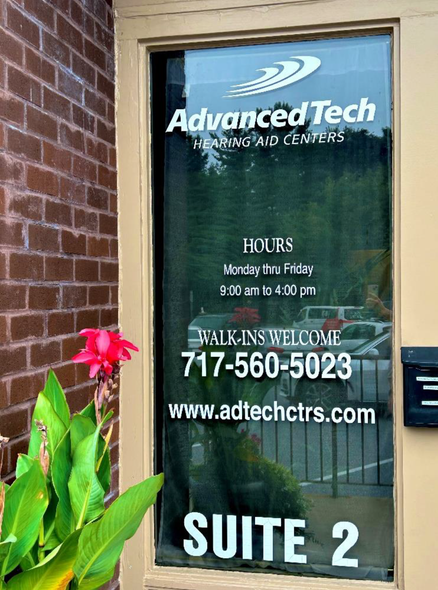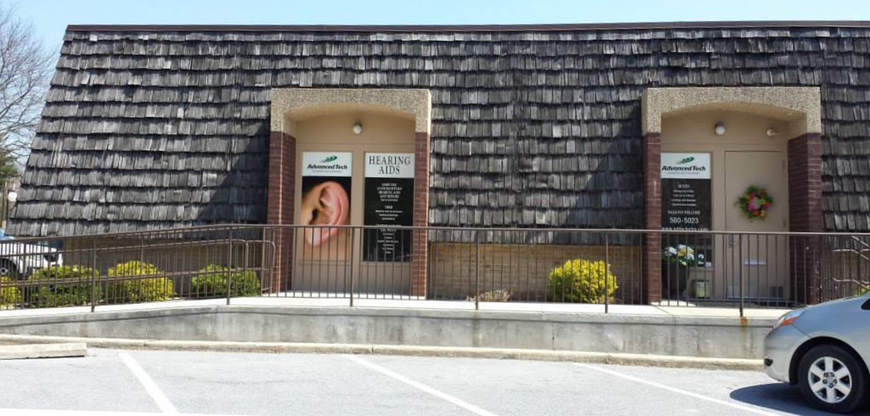Hearing Aid Services in Lancaster County, PA
Request Call Back
Hero Request Form
Experience Clearer Hearing With Advanced Tech Hearing Aid Centers
Advanced Tech Hearing Aid Centers has been a trusted name in Lancaster County, PA, for over 40 years. As a family-owned and veteran-owned business, we pride ourselves on treating our patients like family. Our commitment to honest and open communication ensures that you receive the best possible care. We offer a range of services, including on-site repairs, home visits within 24 hours, and walk-in availability. Our team includes a Doctor of Audiology, and a Audioprosthologist, along with Hearing Instrument Specialists, who are all registered by the Pennsylvania Department of Health.
Our dedication to excellence has earned us several reader's choice awards, a testament to our unwavering commitment to our patients. We offer a two-week free trial for hearing aids, free batteries for life, and loaner hearing aids to ensure you never miss a moment. With Telehear remote programming services, we bring convenience to your doorstep. Whether you need weekend or evening appointments, we're here to accommodate your schedule. At Advanced Tech Hearing Aid Centers, we believe in providing personalized care that meets your unique needs. Contact us today for our hearing aid services.

Why Choose Advanced Tech Hearing Aid Centers?
Choosing Advanced Tech Hearing Aid Centers means choosing a partner dedicated to your hearing health. Our extensive experience, coupled with our family-oriented approach, ensures that you receive the highest level of care. We offer a comprehensive range of services, from on-site repairs to home visits, making it convenient for you to get the help you need. Our two-week free trial and free batteries for life demonstrate our commitment to your satisfaction. With over 40 years of experience and a team of professionals, you can trust us to provide the best solutions for your hearing needs.
Weekends and Evenings by Appointment
Home Visits Available Within 24 Hours
Free Trials for Hearing Aids Available
Free Batteries
for Life
Loaner Hearing Aids Available
Walk-Ins
Welcome
Hearing Aids Overview
At Advanced Tech Hearing Aid Centers, we offer a wide selection of hearing aids to suit various needs and preferences. Our devices are designed to provide clear, natural sound, helping you stay connected to the world around you. We carry the latest technology, including digital and programmable hearing aids, ensuring you get the best performance and comfort. Our experts will work with you to find the perfect fit, taking into account your lifestyle, hearing loss, and budget.
Mobile Apps for Hearing Aids
Modern hearing aids come with mobile apps that enhance their functionality and ease of use. These apps allow you to adjust settings, monitor battery life, and even receive remote programming from our specialists. With just a few taps on your smartphone, you can customize your hearing experience to suit different environments, such as noisy restaurants or quiet libraries. Our team will guide you through the setup and use of these apps, ensuring you get the most out of your hearing aids.
Hearing Aid Maintenance
Proper maintenance is crucial for the longevity and performance of your hearing aids. At Advanced Tech Hearing Aid Centers, we provide comprehensive maintenance services, including cleaning, battery replacement, and on-site repairs. Regular check-ups and professional cleaning can prevent issues and ensure your devices are working optimally. Our experts will also teach you how to care for your hearing aids at home, so you can enjoy clear hearing every day.
Our Services
From initial hearing assessments to fitting and programming your hearing aids, we are with you every step of the way. We provide home visits within 24 hours, walk-in availability, and weekend and evening appointments to accommodate your schedule. Our Telehear remote programming services bring expert care to your home, ensuring you receive timely support. With our commitment to personalized care and extensive experience, you can trust us to deliver exceptional service.

Here's what our satisfied customers are saying...
At Advanced Tech Hearing Aid Centers, we take pride in providing exceptional hearing aid services to our customers. We would be grateful if you could share your thoughts about our business with others. Your feedback helps us improve and helps others make informed decisions. Please take a moment to leave a review of Advanced Tech Hearing Aid Centers and let others know what you think.



Share On: